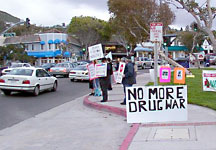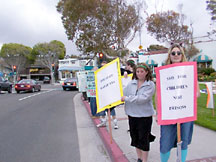 |
Vigils, vigils, vigils
Border Notes: Living in a war zone
By Deitra Lied, TNC regional leader
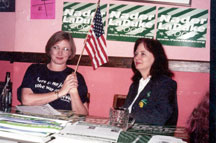 Mexico
has provided the United States with a drug-supply market for
many years. With a significant amount of Colombian trafficking
now moving to Mexican dealers, a real concern is growing in the
Southwest about the "Colombianization of Mexico." The
elimination of many Colombian organizations has allowed Mexican
dealers to gain influence in the industry, dictating terms with
their Colombian providers and taking over distribution in many
U.S. regions. Mexico
has provided the United States with a drug-supply market for
many years. With a significant amount of Colombian trafficking
now moving to Mexican dealers, a real concern is growing in the
Southwest about the "Colombianization of Mexico." The
elimination of many Colombian organizations has allowed Mexican
dealers to gain influence in the industry, dictating terms with
their Colombian providers and taking over distribution in many
U.S. regions.
About 70 percent of the cocaine market flows through the shared
3,200-kilometer border with the U.S., multiplying by the mile
the potential for corruption and violence. Murders, kidnappings,
theft and assault are more frequent in recent years; so much
that both sides of the border have support groups for victims
of "druglord crimes."
Just as in the U.S. and perhaps more, drug corruption reaches
the highest branches of Mexican government. It has grown such
deep roots that political imbalances resulting from the elimination
of that corruption can have effects in Washington D.C. Mutual
agreement about drug policy matters is still secondary in Mexico
and U.S. relations, mostly dominated by immigration and commerce
issues.
Most Mexicans and many U.S. citizens contend from experience
that U.S. customs agents are also "on the take" and
permit some vehicles to cruise through border inspection stations
in exchange for money. If relatively well-paid U.S. agents aren't
immune to the seduction of easy money, how can we expect ordinary
citizens to be immune? If you have ever visited the U.S./Mexico
border area, you would remember the long wait at the entry point
coming back into the country. In order to eliminate these epic
waits, businessmen from both sides of the border fought for and
won a "fast lane" for U.S. and Mexican citizens who
are "pre-cleared" by U.S. law enforcement agencies.
How easy will it be for traffickers to use that "fast lane"
for illegal drug shipments?
Historically, border natives have been a law unto themselves.
Such lawlessness developed from both countries struggling over
the border for being neither American nor Mexican enough. Alienation
and resentment grows as border security employs police-state
tactics. Intensified interdiction efforts along the border in
the name of security are fragmenting the people even more, keeping
them too frightened to speak out against intrusions of privacy.
The Mexican Highway Department randomly stops vehicles to check
documentation. El Paso police followed suit by initiating a 'zero
tolerance operation' establishing traffic checkpoints throughout
the city to ensure "proper documentation." In both
departments the officers have expanded their checks to include
searches of the vehicles. Currently, the El Paso City Council
is discussing a program called TIP - Targeting Intoxicated Patrons
- that allows police officers to enter local bars to make arrests
for public intoxication based only on their individual judgements.
These measures are intended to be preventive, but are they only
preventing individual rights and freedom?
The JuárezEl Paso population of 2 million makes up
the largest border community anywhere in the world, expanding
more than 5 percent a year. Juárez is now Mexico's fourth
largest city with a population of 1.3 million and 50,000 more
arriving each year. Two countries with very different economic,
civic and cultural rules govern this single metropolis. This
is where the 1st world meets the 3rd world. These people breathe
the same air, drink the same water and share the same destiny.
By next year, Hispanics will be the dominant ethnic growth in
the U.S. with at least 15 additional House districts. Every state
slated for a new seat in Congress has a growing Hispanic population
to thank for it. Hispanics have become the largest, so-called
minority group in the U.S. Isn't it time now for all minority
groups to flex their muscles in unity through the power of the
vote? Run for office. Repeal laws against our freedoms. End this
unjust drug war. Stand up and be heard.
San Francisco vigil continues
By Patty Neilson - TNC regional
leader
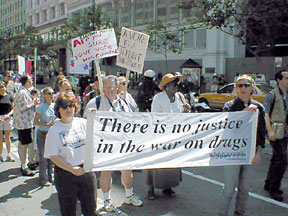
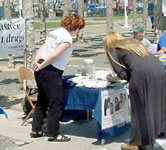 On
July 5 the San Francisco Chapter of the November Coalition met
near the Federal Building at the corner of Polk and Golden Gate
in San Francisco to pass out copies of the Bill of Rights to
federal workers and other citizens returning from work after
the July 4 holiday. Some folks dressed in colonial costumes for
eye-catching appeal. On
July 5 the San Francisco Chapter of the November Coalition met
near the Federal Building at the corner of Polk and Golden Gate
in San Francisco to pass out copies of the Bill of Rights to
federal workers and other citizens returning from work after
the July 4 holiday. Some folks dressed in colonial costumes for
eye-catching appeal.
Vigilers met in the morning for a couple hours at this busy corner.
On the flip side of the Bill of Rights document was a statement
about how the Drug War has affected and diminished Constitutional
authority along with a few things we can do to stop it and why.
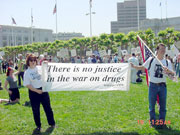 By
standing up at the Federal building we went to the heart of the
Drug War. While we may change few federal minds, and other closed
ones as well, we will take back the spirit of the Bill of Rights.
It is the high ground, and we should use and cherish it as our
heritage and a sound basis for all people's freedom. By
standing up at the Federal building we went to the heart of the
Drug War. While we may change few federal minds, and other closed
ones as well, we will take back the spirit of the Bill of Rights.
It is the high ground, and we should use and cherish it as our
heritage and a sound basis for all people's freedom.
Never doubt that division among people cripples and kills unity
of purpose. Young and old, good and bad, black and white, our
intent is still to overcome power. Within TNC our first mission
has been to humanize all victims of the drug war. We're still
working on that.
Who can deny that "the propagandist's purpose is to make
one set of people forget that certain other sets of people are
human?" as author Aldous Huxley insisted.
Tulia Freedom Riders
on the move
By Karen Heikkala, TNC regional leader in
Austin
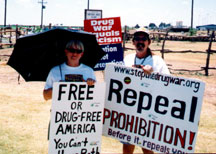
Two buses of Tulia Freedom Riders left Austin at midnight
on July 21 heading for Tulia, Texas and the Never Again Rally.
On the way, the 65 Freedom Riders stopped at the Wheeler Substance
Abuse Felony Punishment Facility and the adjacent Formby State
Jail to hold a vigil.
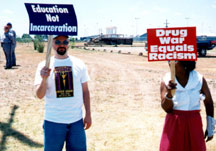 One
of the men captured in the Tulia drug sting is currently in this
prison. Together these units confine about 1,500 men. The State
Jails in Texas were designed to incarcerate substance abuse offenders
but also hold transfer prisoners. The majority at Formby is non-violent,
African-Americans held behind fence and razor wire outside the
small town of Plainview, Texas, a flat, dry, and very hot place
in the summer. One
of the men captured in the Tulia drug sting is currently in this
prison. Together these units confine about 1,500 men. The State
Jails in Texas were designed to incarcerate substance abuse offenders
but also hold transfer prisoners. The majority at Formby is non-violent,
African-Americans held behind fence and razor wire outside the
small town of Plainview, Texas, a flat, dry, and very hot place
in the summer.
Joined by local supporters, we numbered about 70 strong, standing
with signs, which read, Educate Don't Incarcerate and The Drug
War Equals Racism. We spread out along the highway and around
the corner leading into the units. Twenty or so prison guards
came out and formed a front behind us to make sure we stayed
on the road and not come any closer to the facilities. One filmed
us and the others were silent, refusing to take any November
Coalition tabloids offered. In short, they were very uptight
about this whole scene and didn't quite know how to deal with
us.
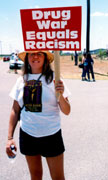 A couple of us managed
to hand out November Coalition four-page tabloids and Texas Inmate
Family newsletters to people arriving in their cars to visit
imprisoned loved ones. These interactions were for me the most
satisfying because we could give needed information and resources
that may encourage them to stand up and fight for their loved
one, motivated by our determined solidarity. A couple of us managed
to hand out November Coalition four-page tabloids and Texas Inmate
Family newsletters to people arriving in their cars to visit
imprisoned loved ones. These interactions were for me the most
satisfying because we could give needed information and resources
that may encourage them to stand up and fight for their loved
one, motivated by our determined solidarity.
An AP reporter and at least one local affiliate of one of the
big three major networks covered our vigil. Dan Forbes, of Salon.com,
and recent recipient of the Edward M. Brecher Award for Achievement
in the Field of Journalism, completed the first leg of the Freedom
Ride and was present at the vigil as well.
Numerous stories and pictures have now been displayed in newspapers
across Texas, and the vigil was an important part of all the
reports. Let's keep this momentum alive!
Libertarians hold twin
vigils in
Los Angeles and San Francisco
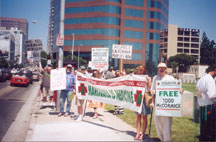
Libertarians in Los Angeles and San Francisco held simultaneous
twin vigils on Saturday, June 16, to honor victims of the long
running but failed War on Drugs. The gathering in Los Angeles
met at the federal building while San Francisco vigilers held
forth at Powell and Market Streets. The Political Prisoners Support
Committee of the Libertarian Party of California organized the
twin vigils.
"The War on Drugs is nothing more than a political war,
and the victims of this war - whether dead or alive - must never
be forgotten," said Hal Chiprin, chairman of the Political
Prisoners Support Committee. "This includes everyone from
non-violent drug users who have been incarcerated, to medical
marijuana patients who continue living in fear of persecution,
to innocent civilians and law enforcement who have been caught
in the crossfire of the Drug War."
"We invite anyone whose life has been touched by this insane
war to join us in commemorating these victims," Chiprin
said. Participants at the Los Angeles vigil marched down Wilshire
Blvd. to the Westwood Memorial Gardens where the ashes of best-selling
author Peter McWilliams are interred.
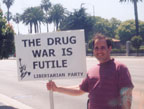 McWilliams, an outspoken
Libertarian and medical marijuana activist, died one year ago
on June 14, 2000 after a long battle with AIDS and non-Hodgkins
lymphoma. At the time of his death, McWilliams was awaiting sentencing
on federal marijuana charges. The judge in the case had prohibited
McWilliams from taking the medical marijuana that allowed McWilliams
to withstand the effects of his AIDS and lymphoma medications. McWilliams, an outspoken
Libertarian and medical marijuana activist, died one year ago
on June 14, 2000 after a long battle with AIDS and non-Hodgkins
lymphoma. At the time of his death, McWilliams was awaiting sentencing
on federal marijuana charges. The judge in the case had prohibited
McWilliams from taking the medical marijuana that allowed McWilliams
to withstand the effects of his AIDS and lymphoma medications.
"Peter McWilliams was a hero to all victims of the Drug
War. It is only fitting that we pay our respects to someone who
died for what he believed," noted Chiprin in his press release
before the vigils. Nearly 100 people gathered in Los Angeles,
according to Chiprin. He also thanked Patty and Owlswan for assembling
vigilers in San Francisco. The twin vigils involved cooperation
with California members of November Coalition and the Libertarian
Party's voter education efforts.
For additional information and to volunteer, Chiprin suggests
contacting egroup lpcppsc@yahoogroups.com.
Everyone can post to the group and subscribe by sending an e-mail
to lpcppsc-subscribe@yahoogroups.com
Hal Chiprin, Chairman
Political Prisoners Support Committee of the Libertarian Party
of California
Phone: (805) 653-1999 · Mail to: hallucy@webtv.net
· Website: http://www.ca.lp.org
Tucson Arizona Protest
May 2001
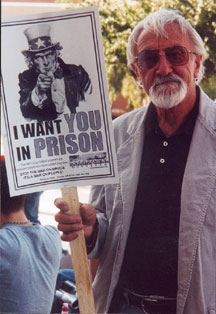 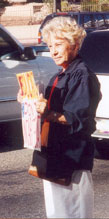
Johane and Shel Coudray at the Tucson protest.
Photos sent by Ted Berkey
Laguna Beach July vigil
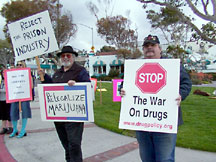

|

